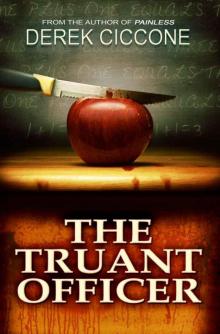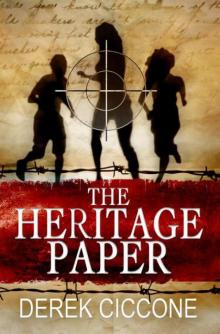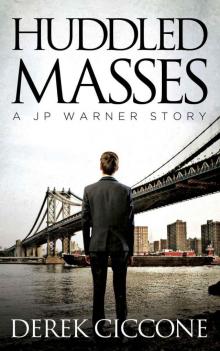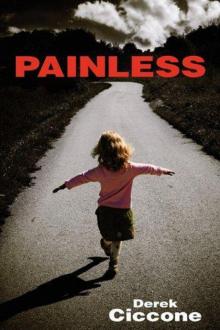- Home
- Derek Ciccone
The Heritage Paper
The Heritage Paper Read online
Table of Contents
Title Page
Book Jacket
Dedication
Chapter One
Chapter 2
Chapter 3
Chapter 4
Chapter 5
Chapter 6
Chapter 7
Chapter 8
Chapter 9
Chapter 10
Chapter 11
Chapter 12
Chapter 13
Chapter 14
Chapter 15
Chapter 16
Chapter 17
Chapter 18
Chapter 19
Chapter 20
Chapter 21
Chapter 22
Chapter 23
Chapter 24
Chapter 25
Chapter 26
Chapter 27
Chapter 28
Chapter 29
Chapter 30
Chapter 31
Chapter 32
Chapter 33
Chapter 34
Chapter 35
Chapter 36
Chapter 37
Chapter 38
Chapter 39
Chapter 40
Chapter 41
Chapter 42
Chapter 43
Chapter 44
Chapter 45
Chapter 46
Chapter 47
Chapter 48
Chapter 49
Chapter 50
Chapter 51
Chapter 52
Chapter 53
Chapter 54
Chapter 55
Chapter 56
Chapter 57
Chapter 58
Chapter 59
Chapter 60
Chapter 61
Chapter 62
Chapter 63
Chapter 64
Chapter 65
Chapter 66
Chapter 67
Chapter 68
Chapter 69
Chapter 70
Chapter 71
Chapter 72
Chapter 73
Chapter 74
Chapter 75
Chapter 76
Chapter 77
Chapter 78
Chapter 79
Chapter 80
Chapter 81
Chapter 82
Chapter 83
Chapter 84
Chapter 85
Chapter 86
Chapter 87
Chapter 88
Acknowledgments
Excerpt from Kristmas Collins
Chapter 2
Chapter 3
Chapter 4
The Heritage Paper
By Derek Ciccone
Copyright © 2012 by Derek Ciccone at Derek Ciccone Books
Feedback and support appreciated at:
Derek Ciccone Book Club on Facebook.
Twitter: @DCicconeBooks
Email: [email protected]
Also by Derek Ciccone:
Painless
The Truant Officer
The Trials of Max Q
Officer Jones
Kristmas Collins
History changes with each turn of the page!
What seems like an innocent school project to trace family history, reveals a dark secret.
Maggie Peterson uncovers that her great-grandmother, Ellen, was part of the inner-circle of Nazi Germany. What’s more, she has left behind clues of a diabolical plot that connects to historical events ranging from Pearl Harbor to 9/11 … all building to the upcoming presidential election.
The claims are met with heavy skepticism, and attributed to the failing mind of an elderly woman. But each passing clue washes away doubt, leaving Veronica Peterson trapped in a mother’s nightmare – her instincts are to protect her daughter’s safety at any cost, but knows that Maggie might be the only chance to prevent a sequel of the worst horror story the world has ever seen … and must let her run toward the danger.
The problem with the gene pool is that there is no lifeguard on duty … Rodney Dangerfield
Dedicated to all who fought valiantly against Nazi tyranny, and those who’ve continued the diligence to keep the nightmare from ever happening again.
Chapter One
She lay still in her bed with her hands clasped close to her chest, pretending to sleep. The darkness was penetrated only by a trickle of moonlight sneaking through the curtains. But she could feel his presence.
The man was not the Grim Reaper, but she knew he’d be the last face she saw in this life.
“Has the great Nazi hunter come for me?” her voice sputtered and creaked. After nine decades of life, turning it on was like starting a car in a frigid Munich winter. She could no longer read an eye-chart without the assistance of a telescope, but she could still sense the surprised look on the man’s face. He had no idea she knew.
“Hello, Ellen,” he spoke in a hushed tone. “Think of me as a gypsy moth that has come to defoliate your evil family tree.”
“How did you figure it out?” she played naïve. She didn’t know if she’d fooled the man, but she sure had convinced her own family that she was a dementia-stricken loony tune. The most damning evidence occurred when they found her wandering the grounds in the middle of a cold night, and claiming to have spotted aliens.
“When I was a medical student, a wise doctor told me a story. It was about a young prostitute he treated in Munich named Etta. She had been impregnated by a German soldier and feared for her life if she elected to have the child. The pregnancy was further complicated by Etta’s lifestyle, which had included contracting a severe case of syphilis.
“The doctor risked his own safety to hide out Etta and nurse her to health … and she eventually gave birth to a baby girl. It wasn’t until many years later that this doctor realized he’d helped spread the seeds of evil—a knowledge that led to his murder.”
“And this is relevant to your presence here tonight?”
“You see, that child he delivered was named Ellen.”
She tried to smile, but the muscles in her face no longer cooperated with her demands. “There are those who claim that you no longer have the passion—that you’ve been diverted by your wealthy American lifestyle. But I can tell that the fire still burns deep inside you. It’s why I chose you.”
She strained through her foggy cataracts to see the surprised look on his face. But there was no time to savor small victories. She pointed sharply at the small end-table beside his chair, causing a painful tingle in her arm.
He pulled the chain on a desk lamp and a dull light illuminated the table. A gold cross glistened in the light.
The Nazi hunter appeared mesmerized as he took it into his hands, paying particular attention to the engraved symbol v^988v^ . On the back was Ellen’s Apostle name of Andrew. Like the original, and more famous Apostles, there were twelve of them.
“I’ve seen this before—when we captured Bormann in South America, almost a half century ago. He told us if we ever saw the symbol again, it would mean the Reich was on the verge of regaining power. I thought he was just using it as leverage because …”
“You and your partner were about to kill him,” she finished his thought.
He said nothing, his silence admitting his guilt. That is, if killing a swine like Martin Bormann, the Führer’s personal secretary, could ever be associated with an emotion like guilt. Not only did he betray the Apostles, but he hurt Ellen in the most personal of ways. His Apostle name of Judas was fitting.
The Nazi hunter continued to peer at the cross. For all his “big game hunting” that took him across the globe, those he most dreamed of having stuffed on his mantle were right under his nose. But the ironies were just beginning.
“What does this symbo
lize?” he demanded.
“Why are you dragging this out? You came to kill me tonight—so get on with it,” she bristled at him.
“If you don’t answer me, I will not only eliminate you, but the rest of your family.”
His threat was laughable. He’d already begun to “defoliate” her family, and once the gypsy moth began spreading its larvae, it wouldn’t stop until the tree was dead. She did find it interesting that his threat to kill her family was synonymous with the Nazi tactic of sippenhaft. She always found it fascinating that victims seeking revenge often ended up resembling those responsible for their pain.
“It symbolizes the seeds that grew into a tree, and eventually became a forest—one that would one day spread over the land. And that day is here.”
“Why would you tell me this?” he asked, still staring at the cross.
“Because I believe you’re the only one who can stop it.”
He tried to conceal his surprise. “Why would a Nazi like you want to stop the expansion of this forest, as you call it?”
“The struggle has led to nothing but suffering for my family. My children have been taken from me, and now with the moment so close, I fear an even worse fate for those who remain.”
“Any suffering you faced doesn’t remotely compare to what you’ve inflicted. The only way to stop another generation of evil is to remove the tree at its roots.”
“Evil is not passed on like brown hair or the shape of a nose—it is taught. Using your philosophy, you would kill all the flowers in the garden just to ensure there are no weeds. But all you would accomplish is to steal beauty from the world. Are you saying that all those SS men were genetically inclined to murder? And if so, why did most return to peaceful lives when the war ended?”
“What your family perpetrates is far greater than the acts of the common SS man, no matter how vile he was. Because you have the ability to transfer it to others and inspire them to spread your hatred.”
“Was my grandson transferring evil when you murdered him? He was an innocent victim—a father, a husband—just like those you claim to seek justice for.”
His tone remained cold and unyielding. “Once I learned of his heritage, there was no other option. He wouldn’t have been able to help himself … it was his nature.”
Ellen didn’t have time to advance the ‘nature versus nurture’ debate. It had been going on long before they arrived on this planet and would rage on long past their deaths. Besides, her plan wasn’t to dissuade the Nazi hunter from his beliefs—there was little chance of that—what she wanted was his assistance.
She pointed to the drawer of the end-table. He was now under her spell, and followed her instruction. But when he slid out a piece of paper from the drawer he looked disappointed. This object was not gold, nor did it have historical significance. It was an invitation to witness her great-granddaughter present her Heritage Paper to her sixth grade class.
“If you want to protect your family, as you claim, why would you provide me such access to them?”
The irony caused the smile to finally appear on her face. “Because if you’re going to stop the Reich from returning to power, you will need Maggie’s help.”
“You will use any lie or tactic to save yourself. How else can you explain hiding out all these years under the cover of being a persecuted Jew? As if the actions of you and your fellow Nazis were not depraved enough!”
“I’ve lived many lies throughout my life, many of which I’m ashamed of. But I never lied about being Jewish.”
“More lies! Your deception can’t save you anymore!”
“My mother’s name was Etta Sarowitz—a Jewish prostitute from Munich. Perhaps your doctor friend failed to mention that part in his story. History tends to pick and choose the truth, depending on whether it fits the narrative of the author. Without a father around, I took her surname of Sarowitz—the name I used upon coming to America, and until I married. While many of my fellow Apostles took aliases to survive, Ellen Sarowitz was my given name.”
It was a good thing the Nazi hunter was sitting, or he might have fallen and broken a hip. He searched her face for a lie, but the deep lines told an ugly story that couldn’t be hidden. She spoke the truth, and he knew it
“But if you’re Jewish …”
“Then it’s the great ruse of history.”
As the Nazi hunter tried to wrap his mind around the bomb she just dropped, Ellen bit down on the glass vial she’d hidden behind her dentures.
The room turned hazy and began to spin. She never used drugs, so she finally was getting to experience the ’60s, a time her children were so enamored with.
The Nazi hunter called out, “No!” But his voice seemed miles away. He was too late.
A beautiful painting filled the canvas of Ellen’s mind. She was back on her first date with her husband, Harold Peterson—he’d taken her to Central Park for a picnic lunch. It was late October and a stiff wind was blowing the fall foliage off the trees. The leaves looked like a rainbow as they floated to earth.
She focused on one large oak tree with a stout trunk. The vision was so clear that she felt she could reach out and touch it. But slowly the picture turned blurry, as if she was looking at it through the steamed glass of a shower door.
She said her final prayers, but they weren’t for herself—she knew her judgment would be harsh. She asked for compassion for Josef and Harry Jr.—her innocent children who were given burdens they couldn’t handle—along with her grandson, Carsten. All taken too soon.
But most of all, she asked to give Maggie and Jamie the strength they’d need to end the cycle, and for the Nazi hunter to guide them with his experienced eyes.
Her mind flashed back to the tree in the park. The stiff wind picked up, continuing to blow the leaves off the branches until they were almost bare. She watched them float downward in slow motion, and when the last leaf hit the ground, everything went dark.
Chapter 2
“Maggie, c’mon, you’re going to be late,” Veronica Peterson shouted up the stairwell to her twelve-year-old daughter. She waited a moment, still no reply.
But there was no time to dwell on it. She swooped into the kitchen and caught nine-year-old Jamie about to douse his sister’s cereal with jalapeño sauce. She grabbed the jar out of his stunned hands on her way to the toaster.
“Haven’t you poisoned enough food this week?” she asked, while hastily buttering a piece of toast.
Jamie smiled his “can’t be mad at me” smile. Her husband used to say it was like Mariano Rivera’s cut-fastball—you knew it was coming, but it would still get you every time. She wasn’t a big baseball fan, but understood the power of Jamie’s smile. And it worried her.
“I’m sorry, Mom. I thought it was sugar. You know how Maggie likes sugar on her cereal … and with her project this morning …”
Yeah right.
The Maggie reference served as a reminder to check on her again. While Jamie was impossible to remain mad at, Maggie was quite the opposite. Veronica was convinced that she thrived on it—acceptance was the enemy.
Maggie had worked so hard on her Heritage Paper, trekking over to her Oma’s place a couple times a week to interview her about the family history, or at least Ellen’s version of it. Veronica was so proud of her effort, and thought she was finally starting to integrate into her new school, but on the day of the presentation she wouldn’t even get out of bed. She was such a mystery.
“Maggie—I’m not kidding,” Veronica yelled again up the stairs. “It would be a shame for you to put all this work in and then not show up.”
No response.
All she could hear was Jamie crunching his cereal.
“What did I tell you about closing your mouth when you eat?” she asked on another walk by.
“I’m sorry, Mom.”
Yeah right.
She hurried up the stairs to Maggie’s room. She stared at the unfamiliar door, plotting her next move. The house was a lot d
ifferent from their apartment in the city. It wasn’t that Veronica disliked it; it’s just what it represented.
She wanted to knock down the door like in one of those TV cop shows, but with her luck she figured she’d end up breaking her foot. And on top of that, Maggie never responded to threats. She perpetuated a stubbornness that always made Veronica’s mother make snide comments about acorns falling near trees. There were rumors about Veronica having a similar stubborn streak during her youth.
She lightly knocked, then waited … nothing.
Maggie was likely playing her music too loudly through her headphones, in defiance of Veronica’s warnings about deafness.
Passion for music was another handed-down trait, although their tastes differed greatly. Maggie had recently converted from bubblegum pop to a mishmash of loud and angry, which corresponded with her latest personality twist. Veronica preferred the classics—if 1980s “glam metal” was considered to be classic.

 The Carolyn Chronicles, Volume 1
The Carolyn Chronicles, Volume 1 The Truant Officer v5
The Truant Officer v5 The Heritage Paper
The Heritage Paper (2012) Officer Jones
(2012) Officer Jones Huddled Masses (JP Warner Book 2)
Huddled Masses (JP Warner Book 2) Psycho Hill (JP Warner Book 3)
Psycho Hill (JP Warner Book 3) The Jack Hammer
The Jack Hammer Officer Jones
Officer Jones Painless
Painless